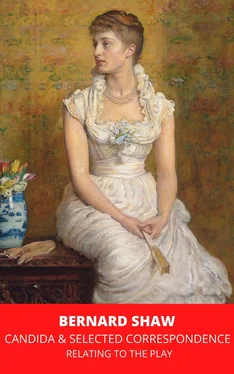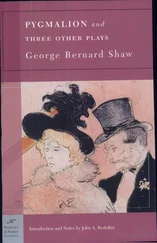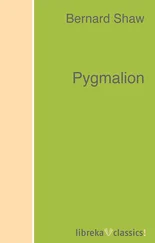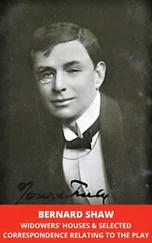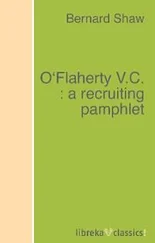Will Miss Morton and other American authors please note that the art of writing plays without explanatory asides has been brought to perfection here, and that the English high-critical nose is apt to turn up at dramatists who have not mastered it. And will Mr Hare remonstrate seriously with his musical director for inflicting on an audience which never injured him a so-called “overture” entitled The Globe, consisting of an irritating string of national anthems, and finally dragging the audience out of their seats with God save the Queen . It did not inconvenience me personally, because even if I were the most loyal of subjects I should not stand up on my hind legs like a poodle for every person who waved a stick and played a tune at me; but the more compliant people can hardly enjoy being disturbed except on special occasions.
Sweet Nancy seemed to me a little stale at the Avenue [Theatre]: Miss [Annie] Hughes, with all her cleverness, played it on the first night as if she had had enough of it. Miss [Marion] Thornhill, the lessee, plays Mrs Huntly, presumably for practice. Miss Lena Ashwell is now the Barbara Gray. In the first act she does one of her wonderful exits, which almost bring the house after her with a rush; but the part is quite beneath her; and I deliberately came away at the end of the second act because I knew she would get round me in the pathetic bit in the third if I waited.
G. Bernard Shaw
74/ Reginald Golding Bright’s article THE PLAYS OF “G.B.S.” contributed to a newspaper the Weekly Sun
20th March 1898
Volume I consists of those plays which the author is pleased to term “unpleasant”—the unpleasantness lying in the fact that they convict the capitalistic phase of modern social organisation, and are written from the point of view of a Socialist who regards the basis of middle-class society as thoroughly rotten, economically and morally. Under this heading come “ Widowers’ Houses ,” “ The Philanderer ,” and “ Mrs Warren’s Profession .”
The root idea of the first-named was the rich suburban villa standing on the rents of the foul rookery; of the second, a four-act topical comedy, the fashionable cults of Ibsenism and “New Womanism” on a basis of clandestine sensuality—the Independent Theatre refused to produce it on account of its “immorality”!; whilst in the third, Mrs Warren taxes society with her occupation. . . .
Volume II—“ Pleasant Plays ”—will comprise “ Arms and the Man ,” the sparkling comedy, in three acts, of youthful romance and disillusion, which was the despair of the critics on its production at the Avenue in 1894; “ The Man of Destiny ,” a one-act comedy, in which Sir Henry Irving had intended to appear as the youthful Napoleon; “ You Never Can Tell ,” a four-act modern comedy concerned with the adventures of a sparkling pair of twins; and “ Candida ,” a frankly sentimental play, which Mr Shaw hopes to find appreciated by women, if not by men.
R. G. B.
75/ To Charlotte Payne-Townshend
30th March 1898
. . . No: I didn’t go to see “Candida.” Janet [Archer] says she got hold of the last scene for the first time: in fact, the whole play seems to have come off in an unprecedented manner. There is no hurry about the D’s D. It will not be produced until May; and it must run, successful or not, for eight weeks; so if you are back in June it will do. If you come back before it is produced, you will find me in a ferocious and damnable temper, as indeed I am at present. I bully Mrs [Kate] Salt brutally; and [Charles] Charrington says that though my lecture was fine, I never relaxed a fierce frown from one end of it to the other. No matter: I am no longer unhappy, and no longer happy: I am myself. I am gathering myself up for the rehearsals. It is close to midnight: I must stalk off into the path round the park, to embrace my true mistress the Night. I hope this letter will make the other Charlotte YELL with anguish—little enough to expiate my centuries of slavery & misery.
Wrrrrrrrrrrrrrrrrrarrrrrrrrrrrrrrrrrrrrrrrrrrrrrrrrrrrrrrrrrrrrrrrrrrrr !
GBS
76/ Reginald Golding Bright’s article THE GOSPEL OF “G.B.S.” contributed to the Weekly Sun
April 1898
. . . There remains “Candida,” and, for the sake of its purity and strength, one would willingly forget the remaining works—good, bad, and indifferent. It is because Mr Shaw has, for once, not been ashamed to figure as a man of sentiment that he has succeeded in writing a really beautiful play where he failed before through excess of brainishness. In Candida he has depicted the real product of the New Woman movement—a noble-minded, graceful woman of dignity and resource, strong where her husband is weak, a Christian Socialist. The author’s reasons for making the Rev. J. M. Morell, active member of the C.S.U. [Christian Social Union], the Guild of St Matthew, etc., a weak-kneed, windbag rhetorician are not obvious, but in every other respect the play is quite a faultless work of art. If only Mr Shaw would give himself up more frequently to this mood, the reproach that we have no serious drama in England would soon be a gibe of the past.
But which way do his thoughts naturally tend? “It was as Punch that I emerged from obscurity,” he tells his readers in one of his diverting prefaces, and they may be driven to the belief that he prefers to go down to posterity in the same role. Certainly they will not lack material for this view, since, within a few pages of each other, he has made elaborate defences of such parasites on the modern drama as the Censor of Plays and the actor-manager. After that, he who would pluck out the heart of Mr Shaw’s mystery must own himself beaten, but no one can afford to neglect the attempt. These plays, both in idea and treatment, inaugurate a new departure, and, if anyone should fear for their reception in the theatre, let him take comfort from the author’s paradoxical assertion that “it is quite possible for a piece to enjoy the most sensational success on the basis of a complete misunderstanding of its philosophy.” On this assumption a fortune should be in store for the manager who would hazard the production of any one of these plays—save “Candida.”
R. G. B.
77/ To William Archer
21st April 1898
When Eugene, with his apprehensive faculty raised to the highest sensitiveness by his emotional state, hears that long speech of Candida’s about the household, he takes the whole thing in, grasps for the first time what it really means, what the conditions of such love are, and how it is essentially the creature of limitations which are far transcended in his own nature. He sees at once that no such life and no such love are possible for him, and instantly leaves them all far behind him. To put it another way, he jumps to the position from which the Master builder [a character of Henrik Ibsen’s play with the same name] that it was all over with the building of happy homes for human beings. He looks at the comfort and sweetness and happiness that has just been placed before him at its best, and turns away from it, exclaiming with absolute conviction, “Life is nobler than that.” Thus Candida’s sympathy with his supposed sorrow is entirely thrown away. If she were to alter her decision and offer herself to him he would be unspeakably embarrassed and terrified. When he says “Out into the night with me,” he does not mean the night of despair and darkness, but the free air and holy starlight which is so much more natural an atmosphere to him than this stuffy fireside warmth of mothers and sisters and wives and so on. It may be that this exposition may seem to you to destroy all the pathos and sanity of the scene; but from no other point of view could it have been written. A perfect dramatic command, either of character or situation, can only be obtained from some point of view that transcends both. The absolute fitness which is the secret of the effectiveness of the ending of “Candida,” would be a mere sham if it meant nothing more than a success for Morell at the cost of a privation for Eugene. Further, any such privation would take all the point from Candida’s sub-consciousness of the real state of affairs; for you will observe that Candida knows all along perfectly well that she is no mate for Eugene, and instinctively relies on that solid fact to pull him through when he is going off, as she thinks, broken-hearted. The final touch of comedy is the femininely practical reason that she gives for their incompatibility.
Читать дальше
